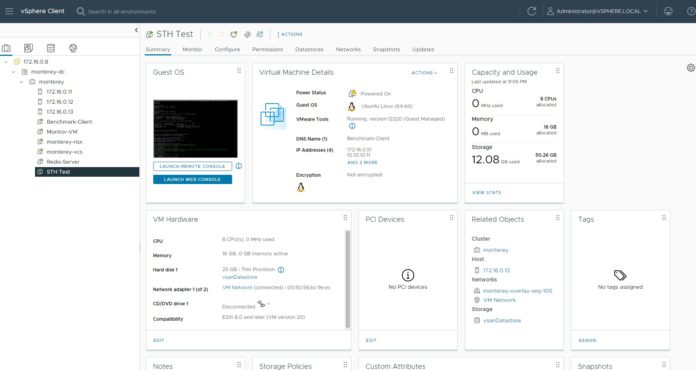
Since we have been tracking the changes in Broadcom’s VMware regime, something that has come to light recently is a sizable number of customers are seeing enormous price increases. Particularly impacted are the smaller managed service providers (MSPs) that service the small and medium business industry. When we say 10x, these are not the types of 10x cost increases that most companies can come back from.
VMware VCSP Customers Seeing 10x or More Cost Increases Under Broadcom
A year ago, VMware ran a successful program called the VMware Virtual Cloud Service Provider (VCSP) program. This was a program where smaller MSPs could get access to VMware products at rates appropriate for resale. Many of these MSPs that service small businesses like doctor’s offices, retail, and hot dog stands (just one example) would have annual VMware bills in the tens of thousands of dollars a year range. The model was to run on-prem and often colocated VMware systems. Often, since the small businesses did not need large servers, the on-site servers would be things like the Xeon E series with well under 32 cores/ socket, which is the target for many VMware shops. A MSP could have 50 customers, but perhaps only 500-600 cores being managed by VMware.
To give some sense, with discounts, that theoretical MSP might spend $50-70K per year in VMware licensing. Under the new VCSP program terms brought to previous customers, the new minimum level seems to be 3500 cores. We have seen this figure on Reddit as well as heard from a number of STH readers, and that 3500 core minimum appears to be a constant.
As a result, we have heard stories of that 3500 minimum costing $650K+ cost after discounts. For those spending $60K per year (taking the midpoint) for a few hundred licensed cores, the prospect of being put into a program that would cost 10x is untenable. They do not have the revenue nor ability to charge for that kind of price increase, especially this rapidly.
Make no mistake, this is a gutting change to MSPs that relied on VMware. As a result, we are bringing this not just to our readers but also to our YouTube audience in the above video.
Final Words
We know many STH readers run MSPs that rely on VMware. From a business perspective, Broadcom is following its standard Broadcom-Avago playbook, increasing prices and focusing on its largest customers. It can do that because it is expensive to switch for those larger customers. For smaller customers, it is not a matter of if they will switch. For most, it will be required to survive.
Something we are encouraging is that our STH readers and viewers who are impacted by this share their experiences. This is the Chicxulub impactor moment for many MSPs, and it is tough to do that alone.




This is definitely Broadcom SOP; though I’m a bit puzzled as to why they aren’t trying to have it both ways: unlike with hardware(say what happend to PLX PCie switch chips when they went from something you’d find on mid-high end gamer motherboards to more or less server only after Broadcom took over); there’s a lot of room to write software licenses differently for different people in order to do some price discrimination.
Broadcom is obviously only really interested in the heavily locked in or highly change-averse large customers who will just suck it up and pay more; but those seem like the sort of customers who are sufficiently heavily locked in and change averse that they are going to be somewhat reluctant to move workloads to the little MSPs getting crushed here. Wouldn’t it be basically free money for them to continue to sell to these small MSPs(presumably with some sort of gotcha that prevents them from effectively taking on the large customers being squeezed; and with more or less zero money being put into support) alongside the plan to squeeze the large customers?
I can understand them killing or re-pricing products that would act as an escape hatch for the customers they are looking to bleed dry; so I wouldn’t expect any mercy for the people who are running full-size VM hosts an Vsphere, just not very many of them, since they use more or less the same licenses as the target customers but aren’t worth nearly as much; but people specifically managing very small systems seem like a customer base you could just issue a core and/or RAM limited SKU for and continue to get paid by.
This reminds me of the move by Oracle Corp to EOL the Standard Edition One of their database server software in favor of Standard Edition Two which meant an upgrade of a $5k/socket to $17.5k/socket retail list + 20% annual maintenance would be required.
Not upgrading was an option.
What I feel is missing from the key lessons learned is, that this can happen at any time with any proprietary software and the only real solution to not face something like this is to go with open source software. Yes, proxmox too could increase the price 10x for their support but that can’t put you out of business anymore if you can’t afford the new prices cause you can still use the open source version without support. And since it’s open source, you can fix issues with it your self, even when you don’t have support from them.
Goodbye VMware. They even nuked the free esxi license, which many (like me) used as an entry point to certification and VMware job roles.
I know several large companies with insane renewals that are migrating off.
Really crappy and hope they lose their ass.
As per recent discussions; Broadcom doesn’t care about anybody but the top 500 Pinnacle and Premier partners, so even if a small MSP wanted to commit to the Premier tier (which I’ve heard is more like $1.25mil), they likely wouldn’t be added to the party unless they were already invited.
All the smaller MSP partners that weren’t invited to the Advantage Partner program are being pushed off to resellers/whitelabel program, that has its own share of headaches/problems for the smaller MSPs that used to be VCSPs. And is not very well defined at the moment. So it is unlikely they would be forced to commit to Premier tier, because it wouldn’t be available for them anyway.
Maybe it’s about time people take a look around for a better and cheaper solution anyways, vmware has been sopping up the gravy for a long time. Since the beginning vmware was always like the linux for idi^H^H^Hwindows admins who are used to high licensing fees, where they’d never consider things like KVM that is itself good enough as open-source to run windows or linux servers. If they want to throw money at a vendor to hold your hand, there’s always Proxmox, Nutanix, and even still XenServer if you actually like Citrix at all.
If you’re a smallish 100% windows shop, might as well use hyper-v, if anyone knows or uses linux at all, use KVM or other commercial and more feature and support rich derivative.
It’s really shame they shooting themselves into the foot with the End of Life for ESXi FREE. This was the entry point for every new IT guy to learn virtualization. Now nobody will ever start to learn when you have to pay for lic. VMUG advantage is still money to put on the table to use the products…. I started to test XCP-NG with Xen Orchestra (which can be compiled by your own, there are guides) so basically you use open source software without support. That’s it. I think most small shops will just migrate to one of the free open source solution with support, but the price of support cannot skyrocket because there is not a single solution. Customer has a choice = customer wins.
I find what is going on with VMware quite astounding but understandably short term-ism.
Yes in the short term Broadcom will probably get good numbers from their investment.
However they are destroying the “IT mind share” as I call it which makes it the defacto go to hypervisor for lots of folks. Capture the mind share of folks coming out of College / University in their first 1 or 2 jobs and they tend to have loyalty as they progress up the IT chain of command into decision making jobs.
All Broadcom’s decisions are as far as I can tell destroying that VMware “IT mind share” and in the long term that doesn’t bode well for them.
Not really sure why some people here think ESXi free was an entry point for sysadmins to teach themselves or to get certified. It never was. I’m not sure if the VCP changed, but since I last took it in 2019, it was mostly about vCenter. And you can either pay for VMUG or like most people just pirate it. It isnt hard to find vSphere/vSAN/NSX license keys
I would disagree depends on your level and understanding. Our pricing decreased as we understand what is needed in the stack. Free users I agree will see a major increase. But for free we have used proxmox and xcp-ng.
@chaim How can you not understand that a free license for a product is an entry point to learning the platform?
I think it was an entry point because it was for me. Other people here agree. It is a common sentiment across forums that ESXi free allowed folks to learn some VMware without spending money (on licenses or memberships) or pirating software.
You’re not going to pass VCP only using ESXi, but thats not the point. The point is to start learning and move onto the next challenge.
I kept VCP for years but left it as I moved to companies who were cloud only. I don’t feel bad about letting it slip now that Broadcom is going full mainframe with it.
We are strongly looking at verge.io
Who doesn’t use core licences these days? I remember when Microsoft moved their Ms SQL from a socket base to a core based licence, the price went insane as well. I’m not saying I agree with Broadcom because they are messing up a truly great product and pricing people out of VMware. It will only make the cloud more attractive.
Any thoughts on migrating from VMware to Nutanix?
This is because during Dell’s ownership of VMware, it was ran into near bankruptcy. For BCM to maintain value of this purchase they had to reduce the waste. While I do not agree with what BCM is doing at all here, I kind of understand it if VMware was that under water from an operations perspective. Ditch the low hanging fruit customers and focus in on the top paying 600 list, make the product suite profitable again, meanwhile screwing 80% of the remaining industry. Hate to tell BCM this, but KVM will probably displace VMware at this point with in 3-5 years from now. With the likes of custom KVM installs, Nutanix, Proxmox,..etc VMware will never maintain the grasp it once had after this. Fun tip, Dell still licenses and sells Nutanix on Dell hardware, they just are not allowed to bring it up to their customers.
I think that despite a lot of people see KVM as a replacement, it is not the best option.
XenServer design is closer from VMWare, but Citrix likes also vendor lock and is neglecting XenServer.
I used XenServer when there was a free edition, but quickly moved to the fork XCP-NG.
I run XCP-NG for five years with 200 VMs without any trouble. The forum is perfect for answering quickly and for those who want support with XenOrchestra enterprise edition, it costs 600 € / month regardless the number of servers.